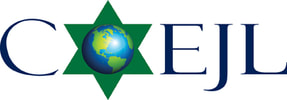Climate Change.
The Torah portion of Noach details a terrible environmental disaster—God’s punishment for humankind’s despicable behavior. Today, as our reckless actions drive climate change, we are once again experiencing widespread destruction of the Earth. This time, the destruction is not a divine punishment, but a direct result of human actions.
The story of the flood begins with a description of the evil that has fallen upon the land: “And the Earth was corrupt before God, and the Earth was filled with violence” (Genesis 6:11). Through technological developments and other means, the people of Noah’s generation no longer feared the strengths of nature. The Midrash (Sanhedrin 108:2) further emphasizes this point, describing the reactions of the people upon seeing Noah building the ark. If a flood of water should come from the land, said the generation of Noah, they would reinforce the land with poles of steel. Their confidence and ignorance made them feel invincible.
The people’s pride and hubris lead them to steal the earth’s resources and disrespect God’s creations. And God responded with the inevitable consequence: a massively destructive flood.
We are now experiencing an equally serious environmental crisis—climate change—characterized by phenomena such as rising global temperatures, extreme weather events, accelerated species migration and extinction, and widespread disease. Most of these problems originate from humankind’s unchecked tyranny of natural resources and our excess waste and pollution.
The forces behind our dire situation echo the very societal ills found in Noah’s generation. We resemble Noah in our willingness to separate ourselves from others so our righteousness will not be blemished. It’s easy for us to stay comfortably ignorant, disregarding the problems of the world.
But ignorance of—and, in many cases, passive or active contribution to—climate change is dangerous and unsustainable. In the story of creation, “God led Adam around all the trees of the Garden of Eden. And God said to Adam: ‘See My works, how good and praiseworthy they are? And all that I have created, I made for you. Be mindful then that you do not spoil and destroy My world—for if you spoil it, there is no one after you to repair it’” (Midrash Kohelet Rabbah 7:13).
There is no one after us to fix our misdeeds. When climate change irreparably damages our world—God’s world, the world of future generations—it will be too late to repent for our sins. We must raise up our voices of conscience and faith and redouble our commitment to a clean and sustainable future. And we must act now.
Source: Rabbi Fred Scherlinder Dobb
The story of the flood begins with a description of the evil that has fallen upon the land: “And the Earth was corrupt before God, and the Earth was filled with violence” (Genesis 6:11). Through technological developments and other means, the people of Noah’s generation no longer feared the strengths of nature. The Midrash (Sanhedrin 108:2) further emphasizes this point, describing the reactions of the people upon seeing Noah building the ark. If a flood of water should come from the land, said the generation of Noah, they would reinforce the land with poles of steel. Their confidence and ignorance made them feel invincible.
The people’s pride and hubris lead them to steal the earth’s resources and disrespect God’s creations. And God responded with the inevitable consequence: a massively destructive flood.
We are now experiencing an equally serious environmental crisis—climate change—characterized by phenomena such as rising global temperatures, extreme weather events, accelerated species migration and extinction, and widespread disease. Most of these problems originate from humankind’s unchecked tyranny of natural resources and our excess waste and pollution.
The forces behind our dire situation echo the very societal ills found in Noah’s generation. We resemble Noah in our willingness to separate ourselves from others so our righteousness will not be blemished. It’s easy for us to stay comfortably ignorant, disregarding the problems of the world.
But ignorance of—and, in many cases, passive or active contribution to—climate change is dangerous and unsustainable. In the story of creation, “God led Adam around all the trees of the Garden of Eden. And God said to Adam: ‘See My works, how good and praiseworthy they are? And all that I have created, I made for you. Be mindful then that you do not spoil and destroy My world—for if you spoil it, there is no one after you to repair it’” (Midrash Kohelet Rabbah 7:13).
There is no one after us to fix our misdeeds. When climate change irreparably damages our world—God’s world, the world of future generations—it will be too late to repent for our sins. We must raise up our voices of conscience and faith and redouble our commitment to a clean and sustainable future. And we must act now.
Source: Rabbi Fred Scherlinder Dobb
